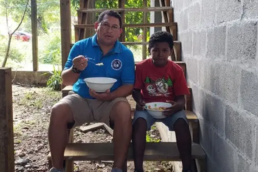Published Nov. 2019
BY DANI TIETZ
dani@sjodaily.com
Whether the turkey is brining in the refrigerator or still on the grocery list for the upcoming week, a feast is about to be prepared.
As families across the nation sit down to dine on the year’s finest, few think about where the food that will be before them came from. Some, though, know exactly where their food was grown, harvested, or processed.
“If you know your farmer and you learn to trust your farmer, I think that’s going to go a long way in ensuring your health long-term,” David Bane, owner of Bane Family Meats, said.
Locally grown and sourced products are nothing new.
David, who grew up on a family farm near Bloomington, Ill., said it was all that he knew until he was an adult.
“We always had great quality food and it spoiled me,” he said.
Once David left the family farm to study veterinarian medicine, he realized that not all food was produced and processed the same way.
He became concerned with the industrialization of agriculture and the use of chemicals, antibiotics and pesticides.
“We never did that on the farm that I grew up on,” he said.
“But I kind of tolerated it because I knew that was the direction agriculture was trending towards: industrialization.”
For a decade, Bane practiced at the University of Illinois’ College of Veterinary Medicine then took a job in the pharmaceutical industry. While raising five children and supplying his family with food, Bane continued to question what he provided for his loved ones to put into their bodies.
“I was really concerned about the quality of food that you could buy in the grocery store,” he said. “And I thought, ‘I can do this a whole lot better,’ so I started doing just that.”
While they raised livestock together, David began by teaching his children the principles that he learned on his family farm all those years ago.

The children were involved with 4-H; each wanted to raise a different species of animal. The diverse livestock gave the Banes what they needed to provide sustenance to their meals. Soon, family, friends and neighbors started asking about their products.
“We would give them some for gifts and we started selling,” David said. “It just kind of grew like that into a business.”
Bane Family Meats has now been serving East Central Illinois for more than 20 years.
David left his job in pharma in the early 2000s to expand on what his children had started.
“I was on the road with my job in corporate America, probably 60- to 70 percent of the time,” he said. “And when my kids were growing up. For me, that was not the direction I wanted to go.”
A surge in local like-minded farming practices gave him a network to grow with.
“There was a growing sense I think in the community at large that we needed better quality food for our families,” he said.
At the time, the restaurant industry caught on, too.
Bane was able to provide antibiotic-free, GMO-free chicken to a restaurant in Urbana.
“Then the business kind of exploded,” he said.
That is until the drought of 2012 hit. The associated costs forced Bane to raise his prices by about 40 percent, which was too steep for the restaurant.
“I didn’t want to raise livestock at a loss,” he said. “So I said this is what I’m going to have to have for us to continue to be able to do business.’”
The restaurant couldn’t meet their bottom line with increasing costs, and had to pull away from the agreement.
While David has and does work with a few businesses, Bane Family Meats’ primarily focuses on the needs of families. They hand-deliver their products to customers, ensuring that each customer gets the freshest meat.
“Customers can buy individual packages of meat: one chicken or one turkey, or they can buy in bulk; they can buy a half of a cow or a quarter of a pig. Or they can also buy a CSA (Community Supported Agriculture).”
CSAs usually provide seasonal vegetables, but Bane Family Farms became a meat CSA about three or four years ago.
The program allows the customer to purchase 5-, 10- or 20-pounds of meat per month on a 6- to 12-month basis. Based on customer feedback, David then customizes the order and delivers it.
“It’s been a great relationship and the people really enjoy the products and then, you know, enjoy me coming and telling them about the farm,” he said.
David said that the relationship he has built with his customers over the years is what is most important.
“They want the best foods available for their families and that’s what I try to provide,” he said. “I’m not about quantity, and more about quality.”
Quality is what David believes is the best medicine.
“Processed food is killing people,” he said. “Just look at the incidents of chronic inflammatory diseases, and there’s an epidemic, obesity, all those things.
“There’s got to be a better way. And this is one of them.”
David said that Bane Family Farms has nothing to hide, either.
“People could come out anytime and see the livestock and see what we do,” he said.
Maybe even more important than customers to David are the animals.
“I’m always aware of what the day is going to bring in terms of stresses on the livestock,” he said.
It’s not just making sure that they have their food and water, but that the temperatures are not too hot or too cold and that they have the proper protection from the elements and predators.
David said it is the most difficult during the summer months.
“When we have a week straight of 90-plus degree temperatures in the daytime and then at night, it will not cool down very much, it’ll be in the low 80s, it doesn’t allow the animals to recover very much from that heat stress and that’s just really devastating on them.”
Using different strategies he’s learned over the years, David is attentive to the animals.
For the chickens, he’ll freeze gallons of water overnight so that during the day the chickens can stand on them.
Being in tune with the animals like that makes it hard for the Bane family to get away.
“One thing that’s a downside of what I do is that I’m so particular about the comfort of the animals that I never ever want to leave here,” he said.

“That means limited vacations and, you know, you’re just pretty much tied down because it’s hard to hire people to come in and take care of the animals that have that same sense of the rhythm.”
The operation does not solely rely on David, though. His children, who live within driving distance, and his wife, Susan, who is a full-time occupational therapist, continue to get in on the fun.
David’s brother also houses the majority of the cattle on his grounds, while David keeps a few cows on his property.
As families, including the Banes prepare to gather around the table for the holidays, David is busy delivering Bane Family Meats turkeys to customers throughout Champaign County and the surrounding areas.
When he first started providing turkeys, David said that families wanted 20-pound birds; now, the demand is for 13- to 14-pounds.
He also said that in the beginning, customers were interested in purchasing meat without bones, and now, having been educated on the benefits of broths, they want the bones, too.
This time of year, business picks up for Bane Family Meats as customers are looking for a special turkey or ham to share with their family and friends. David said that come the new year, the demand will die down a bit before picking back up for the spring, summer, and fall months.
Coming into the new year, the Banes are looking to expand on what they offer on their 14-acre farm, located at 1062 County Road 2125 E, Sidney, Ill.
In years past, Susan has had groups of students come to the farm to learn more about organic sustainable agriculture, the woods and to do crafts. The Banes hope to expand on those offerings as they provide an indoor space below the virgin timber.
Susan is also looking forward to instructing yoga and Zumba.
Groups of students will come to the farm to learn more about organic sustainable agriculture, the woods and to do crafts. A certified yoga and Zumba instructor, Susan also plans to host classes underneath the canopy of the five acres of virgin timber.
To learn more about Bane Family Meats, visit their website at banefamilymeats.com or their Facebook page.


